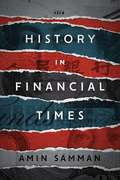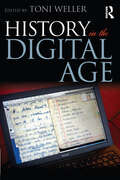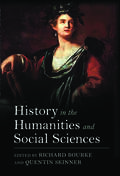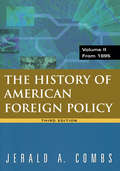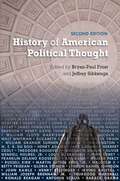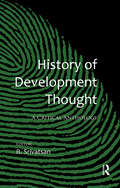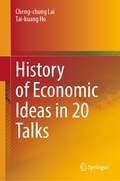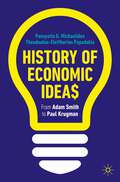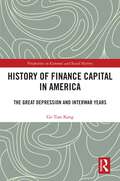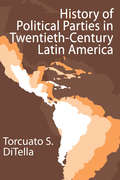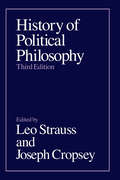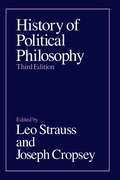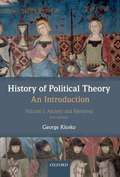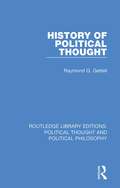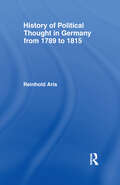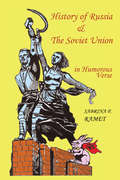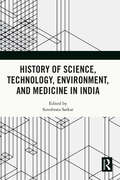- Table View
- List View
History in Financial Times (Currencies: New Thinking for Financial Times)
by Amin SammanCritical theorists of economy tend to understand the history of market society as a succession of distinct stages. This vision of history rests on a chronological conception of time whereby each present slips into the past so that a future might take its place. This book argues that the linear mode of thinking misses something crucial about the dynamics of contemporary capitalism. Rather than each present leaving a set past behind it, the past continually circulates through and shapes the present, such that historical change emerges through a shifting panorama of historical associations, names, and dates. The result is a strange feedback loop between now and then, real and imaginary. Demonstrating how this idea can give us a better purchase on financial capitalism in the post-crisis era, History in Financial Times traces the diverse modes of history production at work in the spheres of financial journalism, policymaking, and popular culture. Paying particular attention to narrative and to notions of crisis, recurrence, and revelation, Amin Samman gives us a novel take on the relation between historical thinking and critique.
History in the Digital Age
by Toni WellerThe digital age is affecting all aspects of historical study, but much of the existing literature about history in the digital age can be alienating to the traditional historian who does not necessarily value or wish to embrace digital resources. History in the Digital Age takes a more conceptual look at how the digital age is affecting the field of history for both scholars and students. The printed copy, the traditional archive, and analogue research remain key constitute parts for most historians and for many will remain precious and esteemed over digital copies, but there is a real need for historians and students of history to seriously consider some of the conceptual and methodological challenges facing the field of historical enquiry as we enter the twenty-first century. Including international contributors from a variety of disciplines - History, English, Information Studies and Archivists – this book does not seek either to applaud or condemn digital technologies, but takes a more conceptual view of how the field of history is being changed by the digital age. Essential reading for all historians.
History in the Humanities and Social Sciences
by Quentin Skinner Richard BourkeThis interdisciplinary volume explores the relationship between history and a range of disciplines in the humanities and social sciences: economics, political science, political theory, international relations, sociology, philosophy, law, literature and anthropology. The relevance of historical approaches within these disciplines has shifted over the centuries. Many of them, like law and economics, originally depended on self-consciously historical procedures. These included the marshalling of evidence from past experience, philological techniques and source criticism. Between the late nineteenth and the middle of the twentieth century, the influence of new methods of research, many indebted to models favoured by the natural sciences, such as statistical, analytical or empirical approaches, secured an expanding intellectual authority while the hegemony of historical methods declined in relative terms. In the aftermath of this change, the essays collected in History in the Humanities and Social Sciences reflect from a variety of angles on the relevance of historical concerns to representative disciplines as they are configured today.
History of American Foreign Policy, Volume 2: From 1895 (Xx Xx Ser.)
by Jerald A CombsFirst Published in 2017. Now thoroughly updated, this respected text provides a clear, concise, and affordable narrative and analytical history of American foreign policy from the revolutionary period to the present. This is Volume II and is from 1895. The historiographical essays at the end of each chapter have been revised to reflect the most recent scholarship. The History of American Foreign Policy chronicles events and policies with emphasis on the international setting and constraints within which American policy-makers had to operate; the domestic pressures on those policy-makers; and the ideologies, preferences, and personal idiosyncrasies of the leaders themselves.
History of American Political Thought, Second Edition
by Bryan-Paul Frost;Jeffrey SikkengaRevised and updated, this long-awaited second edition provides a comprehensive introduction to what the most thoughtful Americans have said about the American experience from the colonial period to the present. The book examines the political thought of the most important American statesmen, activists, and writers across era and ideologies, helping another generation of students, scholars, and citizens to understand more fully the meaning of America. <P> This new second edition of the book includes chapters on several additional historical figures, including Walt Whitman, Lyndon Baines Johnson, and Ronald Reagan, as well as a new chapter on Barack Obama, who was not prominent in public life when the first edition was published. Significant revisions and additions have also been made to many of the original chapters, most notably on Antonin Scalia, which now updates his full legacy, increasing the breadth and depth of the collection.
History of Chinese Imperial Examination
by Liu Haifeng Li BingThis book is a comprehensive and systematic exposition of the history of the emergence, development, and evolution of Chinese imperial examination system. It gathers the author’s insights from over thirty years of research on the history of the imperial examination and can be regarded as a summary work on the study of imperial examination history in China. It follows the historical sequence, taking the development and evolution of the imperial examination as the warp, and the characters, events, activities, and thoughts as the latitude. It not only narrates the history of the imperial examination system, but also pays attention to the actual operation of the imperial examination system. At the same time, it takes into account the historical development of examination thought. And during narration, it focuses on the interaction and interdependence between people and the system, as well as their interactive influence. Therefore, it is both academic and readable.
History of Development Thought: A Critical Anthology
by R. SrivatsanDevelopment thought emerged as the governing principle of First World global hegemony in the new world order marked by the end of the Second World War and decolonization. Six decades later, at yet another critical geopolitical conjuncture marked by globalization and neoliberal resurgence, History of Development Thought revisits the major strands in the development debate from the 1950s to the early twenty-first century. The volume places classic international interventions in critical development thinking alongside major contributions to the discourse from the Indian context.Beginning by juxtaposing W. A. Lewis’s classic liberal theory of the dual economy with P. C. Mahalanobis’s schema for planned development in India, the volume tracks the trajectory of the development debate — from the Latin American neo-Marxist paradigm, through the ‘mode of production’ debates in India, to Indian and international feminist perspectives on development. It explores the departures of the 1980s in India and elsewhere as theorists, including Pranab Bardhan, Sukhamoy Chakravarty, Partha Chatterjee, A. O. Hirschman, Samuel Huntington, and Amartya Sen, sought to address from various perspectives the reasons for the failure of development to live up to expectations. It ends with excerpts signposting the emerging strands of the development (and post-development) debate at the turn of the twenty-first century. Throughout, the volume remains committed to the paradigm of development as a horizon of critical thought and a field of democratic politics, while paying attention to the multiple storylines of the discourse over the last 60 years. This anthology, together with its critical introduction and rigorous prefatory remarks for each extract, will be invaluable to students and researchers in the social sciences and the humanities, especially those in development studies, history, politics and economics, as well as to activists, administrators, and professionals in health, education, and development.
History of Economic Ideas in 20 Talks
by Cheng-chung Lai Tai-kuang HoThis book provides a concise history of economic thought for readers of all ages. While some basic economics knowledge would be helpful, it is not required. The book sets out to achieve three aims: to be interesting, entertaining, and thought-provoking. While the authors may appear opinionated in certain instances, this is intentionally done in order to alert readers to form their own views. History of ideas does not make the us smarter nor richer, but it can reduce our ignorance and the “banality of evil”—a term Hannah Arendt referred to people who lack self-reflection, “He did his duty...; he not only obeyed orders, he also obeyed the law.”
History of Economic Ideas: From Adam Smith to Paul Krugman
by Panayotis G. Michaelides Theodoulos Eleftherios PapadakisThis book examines the history of economic thought and of political economy over the past 250 years. It presents an accessible introduction to the lives and ideas of some of economics' most prominent theoreticians, including at least one representative of each major school of economic thought. Additionally, learning objectives, summaries, key takeaways, and revision questions are included to facilitate learning and self-assessment. The concise nature of this book makes it an easy-to-use guide to the early pioneers of political economy (Smith, Ricardo, Marx, Walras), the 20th century innovators of economics (Keynes, Schumpeter, Hayek, Friedman, Solow), or the more recent research in the discipline (Nash, Sen, Stiglitz, Krugman). Those interested in the history of economic thought will find this book to be an invaluable resource.
History of Finance Capital in America: The Great Depression and Interwar Years (ISSN)
by Go Tian KangGo details through institutional analysis how major financial institutions (including banks and insurance companies), industries, and the U.S. government behaved and linked with each other during the Great Depression and interwar period.Drawing on data that has not been widely used since the late thirties – including congressional hearings, financial data, and government reports concerning economic concentration in the Depression era – Go presents a general picture of American finance capital on the eve of World War II. He details the emergence of important new financial‑industrial powers in the 1920s that challenged the Wall Street’s established order on the eve of Great Depression, the response of the Wall Street’s finance capital to the challenge, and its renewed dominance as well as the growing community of interests between finance and industry under the Depression. He also points out the role of Wall Street’s finance capital in financing the Reconstruction Finance Corporation in 1932, the New Deal, and the emerging war economy.With its coverage of primary sources, this book will interest researchers and advanced undergraduate students taking American history, political science, and institutional economics.
History of Political Parties in Twentieth-century Latin America
by Torcuato Di TellaThe general perception of modern Latin American political institutions emphasizes a continuing and random process of disorder and crisis, continually out of step with other regions in their progress toward democracy and prosperity. In "History of Political Parties in Twentieth-Century Latin America," Torcuato S. Di Tella demonstrates that this common view lacks context and comparative nuance, and is deeply misleading. Looking behind the scenes of modern Latin American history, he discerns its broad patterns through close analysis of actual events and comparative sociological perspectives that explain the apparent chaos of the past and point toward the more democratic polity now developing. Di Tella argues that although Latin America has peculiarities of its own, they must be understood in their contrasts - and similarities - with both the developed centers and undeveloped peripheries of the world. Latin American societies have been prone to mass rebellions from very early on, more so than in other regions of the world. He analyzes, as well, such significant exceptions to this pattern as Chile, Colombia, and, to a large extent, Brazil. Turning to the other side of the social spectrum, he shows how the underprivileged classes have tended to support strongman populist movements, which have the double character of being aggressive toward the established order, but at the same time repressive of public liberties and of more radical groups. Di Tella provides here a necessary examination of the concept of populism and divides it into several variants. Populism, he maintains, is by no means disappearing, but its variants are instead undergoing important changes with significant bearing on the region's near-term future. "History of Political Parties in Twentieth-Century Latin America" is rich in historical description, but also in its broad review of social structures and of the strengths and weaknesses of political institutions. Choice commented that "this heavily documented volume with an extensive bibliography would prove valuable to researchers and advanced students of Latin America.
History of Political Philosophy
by Leo Strauss and Joseph CropseyThis volume provides an unequaled introduction to the thought of chief contributors to the Western tradition of political philosophy from classical Greek antiquity to the twentieth century. Written by specialists on the various philosophers, this third edition has been expanded significantly to include both new and revised essays.
History of Political Philosophy (Third Edition)
by Leo Strauss Joseph CropseyWritten by specialists on the various philosophers, this third edition has been expanded significantly to include both new and revised essays.
History of Political Theory: Volume I: Ancient And Medieval
by George KloskoHistory of Political Theory: An Introduction is an engaging introduction to the main figures in the history of Western Political Theory and their most important works. Volume I traces the development of political theory "from the beginning" in ancient Greece through the Reformation. Main subjects examined include the Classical political theory of the Greek polis, the Hellenistic period, the rise of Christian political theory, political theory of the middle ages, and the Reformation. Major figures examined include Socrates, Plato, Aristotle, St. Augustine, St. Thomas, Marsilius of Padua, and Martin Luther. Throughout, the great theorists are closely examined in their historical contexts, with extensive quotations allowing them to speak for themselves.
History of Political Thought (Routledge Library Editions: Political Thought and Political Philosophy #25)
by Raymond G. GettellFirst published in 1924. This extensive volume explores the history of political theory from Ancient Greece up until proletarian thought in the early twentieth century. The author pays particular attention to the connection between economic and political theory during the eighteenth and nineteenth centuries. History of Political Thought will be of great interest to students of history, politics, and philosophy.
History of Political Thought in Germany 1789-1815
by Reinhold ArisFirst Published in 1965. This study deals with the history of political thought in Germany from 1789 to 1815. It is the story of a nation awaking from a long sleep, commencing to think for itself, to modernize its institutions, to formulate its ideas of the pattern of society and the duties of the State. Modern German literature begins with Klopstock and Lessing. German political thinking comes even later, for it is the child of the French Revolution.
History of Russia & the Soviet Union in Humorous Verse
by Sabrina P. RametThe dramatic history of Russia proves fertile ground for laughter in this volume of humorous verse by the author of Pets of the Great Dictators.Sabrina P. Ramet is a serious academic with a seriously funny side. She has made major contributions to European history with her scholarly work on the former Yugoslavia. But her most unique contribution may be the well-informed and wackily executed poems in this volume. No Russian is safe from Sabrina’s hammer-and-sickle wit. Even the most fearsome and formidable—Lenin, Stalin, Peter the Great, and many others—are shown to be buffoons in this collection of satirical poems as dry as a straight shot of vodka.
History of Science, Technology, Environment, and Medicine in India
by Sarkar SuvobrataThis volume studies the concept and relevance of HISTEM (History of Science, Technology, Environment, and Medicine) in shaping the histories of colonial and postcolonial South Asia. Tracing its evolution from the establishment of the East India Company through to the early decades after the Independence of India, it highlights the ways in which the discipline has changed over the years and examines the various influences that have shaped it. Drawing on extensive case studies, the book offers valuable insights into diverse themes such as the East-West encounter, appropriation of new knowledge, science in translation and communication, electricity and urbanization, the colonial context of engineering education, science of hydrology, oil and imperialism, epidemic and empire, vernacular medicine, gender and medicine, as well as environment and sustainable development in the colonial and post-colonial milieu. An indispensable text on South Asia’s experience of modernity in the nineteenth and twentieth centuries, this book will be of interest to scholars and researchers of modern South Asian studies, modern Indian history, sociology, history of science, cultural studies, colonialism, as well as studies on Science, Technology and Society (STS).
